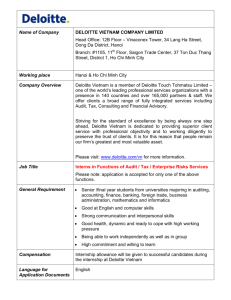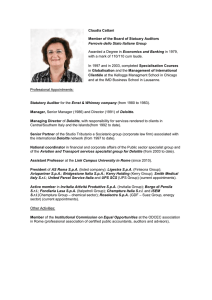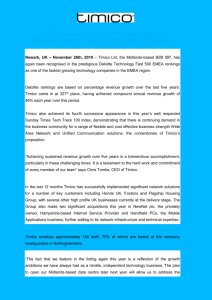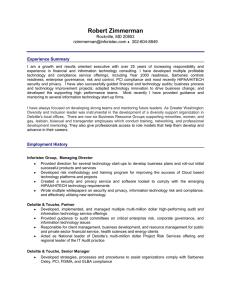deloitte & touche Executive Case Summary Series emerging strategy
advertisement
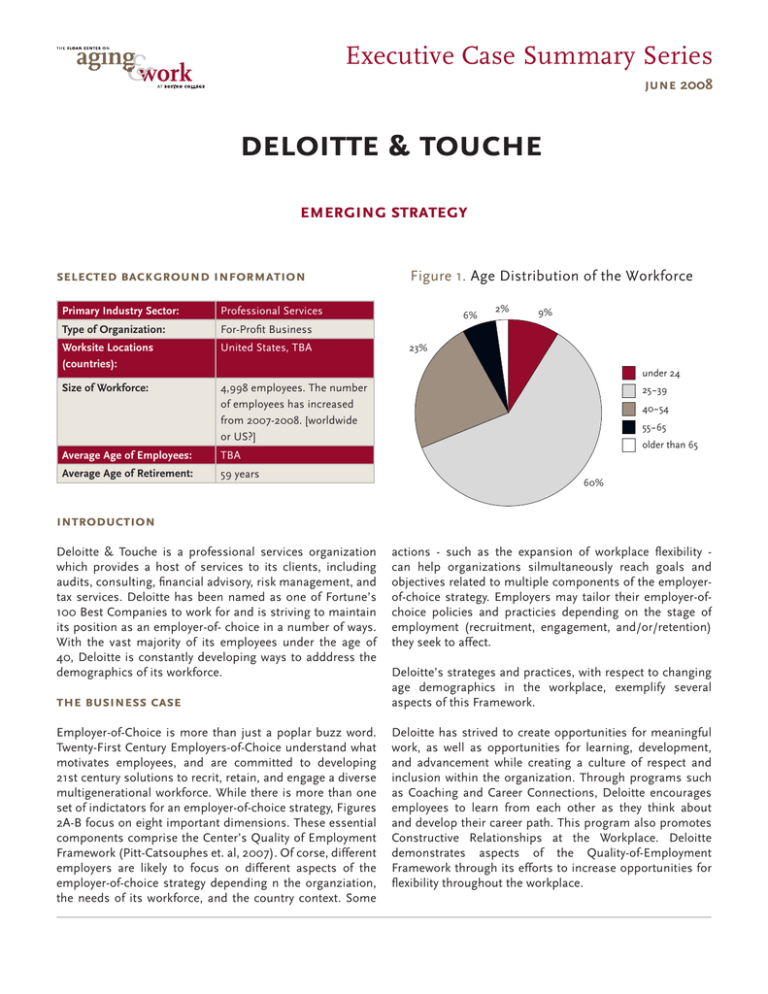
Executive Case Summary Series june 2008 deloitte & touche emerging strategy selected background information Primary Industry Sector: Professional Services Type of Organization: For-Profit Business Worksite Locations (countries): United States, TBA Size of Workforce: 4,998 employees. The number of employees has increased from 2007-2008. [worldwide or US?] Figure 1. Age Distribution of the Workforce 6% 2% 9% 23% under 24 Average Age of Employees: TBA Average Age of Retirement: 59 years 25-39 40-54 55-65 older than 65 60% Deloitte & Touche is a professional services organization which provides a host of services to its clients, including audits, consulting, financial advisory, risk management, and tax services. Deloitte has been named as one of Fortune’s 100 Best Companies to work for and is striving to maintain its position as an employer-of- choice in a number of ways. With the vast majority of its employees under the age of 40, Deloitte is constantly developing ways to adddress the demographics of its workforce. the business case Employer-of-Choice is more than just a poplar buzz word. Twenty-First Century Employers-of-Choice understand what motivates employees, and are committed to developing 21st century solutions to recrit, retain, and engage a diverse multigenerational workforce. While there is more than one set of indictators for an employer-of-choice strategy, Figures 2A-B focus on eight important dimensions. These essential components comprise the Center’s Quality of Employment Framework (Pitt-Catsouphes et. al, 2007). Of corse, different employers are likely to focus on different aspects of the employer-of-choice strategy depending n the organziation, the needs of its workforce, and the country context. Some actions - such as the expansion of workplace flexibility can help organizations silmultaneously reach goals and objectives related to multiple components of the employerof-choice strategy. Employers may tailor their employer-ofchoice policies and practicies depending on the stage of employment (recruitment, engagement, and/or/retention) they seek to affect. Deloitte’s strateges and practices, with respect to changing age demographics in the workplace, exemplify several aspects of this Framework. Deloitte has strived to create opportunities for meaningful work, as well as opportunities for learning, development, and advancement while creating a culture of respect and inclusion within the organization. Through programs such as Coaching and Career Connections, Deloitte encourages employees to learn from each other as they think about and develop their career path. This program also promotes Constructive Relationships at the Workplace. Deloitte demonstrates aspects of the Quality-of-Employment Framework through its efforts to increase opportunities for flexibility throughout the workplace. The Sloan Center on Aging & Work at 1 boston college Executive Case Summary introduction Deloitte hopes to maintain its position as an employer-ofchoice by strengthening its approach to flexibility, recruitment, and managing its young workforce. Figure 2a. Quality of Employment: Strategy Recruitment Deloitte has a particularly young workforce - over 60% is under 40 years old. Deloitte is struggling with how to manage and create programs that support the younger generation entering the workforce, while at the same time supporting the older generation exiting or preparing to exit the workforce. Recently, Deloitte has discovered that only a very small percentage of young people would choose accounting or consulting as their career. There is a growing concern that the company will not be able to recruit enough accountants to run their business the same way as they do today. Opportunities for Development, Learning & Advancement Rewards; Fair, Attractive and Competitive Compensation & Benefits Promotion of Constructive Relationships at the Workplace Wellness; Health & Safety Protections Opportunities for Meaningful Work (at and outside of the workplace) Quality of Employment Provisions for Employability and Employment Predictabilities Workplace Flexibility Culture of Respect, Inclusion, and Equity Career Development As an organization that hires a large number of young people who want to see opportunities for advancement, Deloitte is always mindful of career development opportunities. The challenge is being sure that these opportunities exist. Deloitte recognizes that you cannot bring young people into the organization and expect them to stay until a path is cleared for them. It is also important to Deloitte that they are able to match people with the right role to maximize their potential and engagement within the organization. Flexibility the response Deloitte describes its strategy to handle the demographics of its workfore in a way that maintains their position as an employer-of-choice as evolving. Deloitte has made it a point to study younger generations and their views and Deloitte has been concerned with pipeline and recruitment issues and is considering methods of building the pipeline, such as outreach to students. They are also considering ways to futher develop and retain the employees they currently have through coaching programs, such as Coaching & Career Connections, which is the focus of the following section. Deloitte’s Strategy Vision Statement “To research demographic and workforce attitudes with the intention of creating and implementing innovative initiatives that foster an environment to which the best talent is attracted and will want to stay and grow.” 2 The Sloan Center on Aging & Work at boston college Executive Case Summary Deloitte recognizes that no matter what the age group, everyone wants opportunities for flexibility within their job. The organization was forced to take a more serious look at how to create flexibility when they lost a building in the 9/11 attacks and were obligated to rely much more heavily on technology to meet business needs. expectations of business practices. The organization is now doing the same with mature workers and those who fall in the middle. Deloitte hopes this will yield insight that allows them to better engage their workforce as a whole. promising practice featured promising practice at-a-glance Figure 2b. Quality of Employment: Practice Coaching & Career Connections (CCC) Description: Purpose: A career coaching program which focuses on management and leadership development, career coaching, group coaching, internal mobility coaching, transition coaching, and coaching intiatives. Opportunities for Development, Learning & Advancement Rewards; Fair, Attractive and Competitive Compensation & Benefits To create a coaching-centered work culture in order to foster internal mobility and career development. Target Population: All Deloitte & Touche employees. Launch Date: TBA Promotion of Constructive Relationships at the Workplace Wellness; Health & Safety Protections Opportunities for Meaningful Work (at and outside of the workplace) Quality of Employment Provisions for Employability and Employment Predictabilities Workplace Flexibility Culture of Respect, Inclusion, and Equity implementation Deloitte has found that employees of all ages within the organization want “a little help when it comes to their careers and what comes next.” There are many different options for moves within the company and employees wanted a knowledgeable source with whom they could consult regarding these options. The CCC program is able to provide coaching to all United States Deloitte employees to further develop and maximize their effectiveness, career planning and navigation skills, as well as facilitate internal mobility and increase retention of Deloitte’s “high performers.” CCC addresses six different areas of interest, which include: ρρ Management and Leadership Development Coaching ρρ Career Coaching ρρ Group Coaching ρρ Internal Mobility Coaching ρρ Transition Coaching ρρ Coaching Initiatives “CCC combines the power of 30 full-time professionally trained coaches, geographically dispersed nationally and aligned with the various businesses, who are available to assist all 35,000 US people with development of competencies that maximize effectiveness, career planning and navigation, and facilitating internal mobility to increase retention of high performers.” 3 The Sloan Center on Aging & Work at boston college Executive Case Summary Deloitte implemented the Coaching & Career Connections (CCC) program with the goal of “bringing coaching to everyone - from entry-level employees to partners and principals.” In doing so, Deloitte wanted to create a collaborative culture which embraces coaching. Another reason driving the creation of CCC was to foster internal mobility and career development, thus improving retention of Deloitte’s highly valued and skilled workers. evidence of progress moving forward In order to gauge the success of CCC, Deloitte anonymously surveys participants regarding their overall opinions of the coaching process. Deloitte has found that 94% of coaching recipients felt CCC helped them improve in their current role or prepare for a future role. Furthermore, 60% felt that the coaching program had a positive impact on business results. Deloitte has also discovered that a significant number of employees consider participation in the CCC program as in influencing factor to their staying with the company. Additional successes of the CCC program include: Deloitte will continue to look at innovative ways to remain an employer-of-choice and attract and retain the best talent in the business. The organization plans to continue the Coaching & Career Connections program as well as pursue other avenues, such as developing programs to increase interest in the field among students and increasing flexibility throughout the workplace. ρρ Higher retention of employees; ρρ Improved employee job satisfaction and performance; ρρ Employees are empowered to actively navigate and manage their career path; ρρ Employees feel that coaching is a major contributor to success in future roles. Publication Date: June 2008 The Sloan Center on Aging & Work has developed the Executive Case Summary Series to provide Center Partners and members of Learning Circles with current information about workplace strategies, policies and practices established for today’s multi generational workforce. These cases have been prepared to foster the sharing of information among talent management experts and to accelerate “just-in-time” insights about employer-response to the 21st century workforce even as strategies, policies and practices are just emerging. The Case Summaries contain confidential (and in some cases, proprietary) information about organizations. Therefore, the Center provides these cases only to organizations that are Center Partners and members of Learning Circles. Interested in additional information about this Case Summary? Please contact Samantha Greenfield at 617-552-9117. Pitt-Catsouphes, M., et. al (2007). Employers-of-Choice in Countries-of-Choice (Global Executive Insight No. 01). Chestnut Hill, MA: The Center on Aging & Work/Workplace Flexibility. Retrieved from http://agingandwork.bc.edu/documents/Global01_Employer-of-Choice.pdf 4 http://agingandwork.bc.edu Executive Case Summary Case prepared by: Kathy Lynch and Serena Houle, with assistance from Lauren Sutherland, The Center on Aging & Work at Boston College

